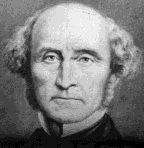
John Stuart Mill (1806-1873), author of On Liberty and Principles of Political Economy, received quite a strenuous education from his father, James, whose Benthamite utilitarianism he adopted as his own.
In addition to his economic and political thinking, Mill is credited with formulating (in his System of Logic [1848]) five guiding principles of induction—the method of agreement, the method of difference, the joint method of agreement and difference, the method of residues, and the method of concomitant variations. They are methods of investigating common factors to determine causation.
Mill's economic studies began at age thirteen. The rigorous plan of education was recounted in his Autobiography (1873).
* * *
It was in ... 1819, that [my father] took me through a complete course of political economy. His loved and intimate friend, Ricardo, had shortly before published the book which formed so great an epoch in political economy; a book which never would have been published or written, but for the entreaty and strong encouragement of my father ... [N]o didactic treatise embodying its doctrines, in a manner fit for learners, had yet appeared. My father, therefore, commenced instructing me in the science by a sort of lectures, which he delivered to me in our walks. He expounded each day a portion of the subject, and I gave him next day a written account of it, which he made me rewrite over and over again until it was clear, precise, and tolerably complete. In this manner I went through the whole extent of the science; and the written outline of it which resulted from my daily compte rendu served him afterwards as notes from which to write his Elements of Political Economy. After this I read Ricardo, giving an account daily of what I read, and discussing, ... the collateral points which offered themselves in our progress.
On Money, as the most intricate part of the subject, he made me read in the same manner Ricardo's admirable pamphlets, written during ... the Bullion controversy; to these succeeded Adam Smith; and ... it was one of my father's main objects to make me apply to Smith's more superficial view of political economy the superior lights of Ricardo, and detect what was fallacious in Smith's arguments, or erroneous in any of his conclusions. Such a mode of instruction was excellently calculated to form a thinker; but it required to be worked by a thinker, as close and vigorous as my father. The path was a thorny one, even to him, and I am sure it was so to me, notwithstanding the strong interest I took in the subject. He was often, and much beyond reason, provoked by my failures in cases where success could not have been expected; but in the main his method was right, and it succeeded.1
Copyright © 2000, The Daily Objectivist - Reprinted with permission of The Daily Objectivist and Davidmbrown.com.
24 Feb 2009 (last edit: 10 Jan 2024)
You can assist the work of Freedom Circle by purchasing one of the works discussed above:
-
John Stuart Mill, Autobiography, London: Longmans, Green, Reader, and Dyer, 1873, pp. 27-29. (Freedom Circle note) ↩︎
